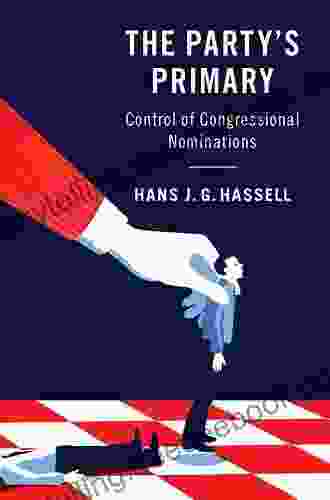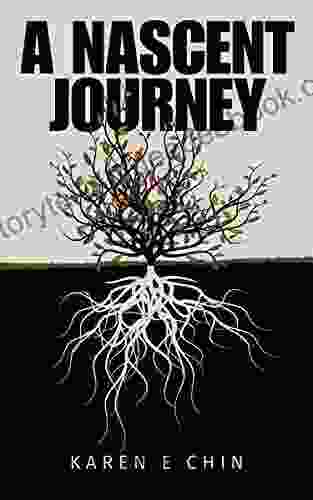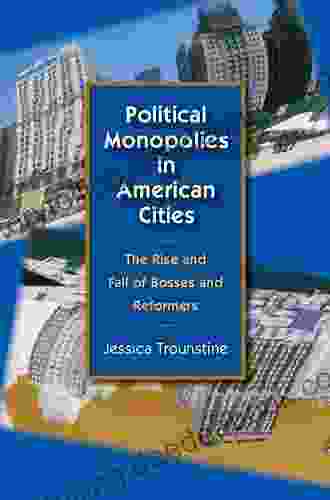The Party Primary's Control Over Congressional Nominations: A Comprehensive Analysis

The party primary system is a cornerstone of the American political process, playing a crucial role in shaping the composition of Congress and the broader political landscape. By granting political parties substantial authority over the selection of candidates, primaries have become the primary means through which candidates are chosen to represent major political parties in general elections.
4.4 out of 5
| Language | : | English |
| File size | : | 2003 KB |
| Text-to-Speech | : | Enabled |
| Screen Reader | : | Supported |
| Enhanced typesetting | : | Enabled |
| Word Wise | : | Enabled |
| Print length | : | 223 pages |
This article will delve into the inner workings of the party primary system, exploring its historical evolution, examining the mechanisms by which parties exert control over candidate selection, and analyzing the consequences of primary control on the political landscape. By understanding the intricate interplay between party primaries and congressional nominations, we gain valuable insights into the dynamics of American democracy and the challenges facing representative government in the 21st century.
Historical Evolution of Party Primaries
The origins of party primaries can be traced back to the late 19th century, during a period of political turmoil and reform known as the Progressive Era. The direct election of senators by popular vote, mandated by the 17th Amendment in 1913, further fueled the movement for primaries as a means to democratize the nomination process.
In the early 20th century, a series of states adopted primary laws, providing voters with a direct say in the selection of party candidates. These early primaries were often open to all voters, regardless of party affiliation, allowing cross-over voting and further complicating the process.
Over time, states began to adopt closed primaries, restricting participation to registered party members. This shift towards closed primaries strengthened the power of political parties over candidate selection, limiting the influence of independents and voters who may have preferred candidates from opposing parties.
Mechanisms of Party Control
Political parties wield significant influence over the congressional nomination process through a variety of mechanisms, including:
- Party Rules and Procedures: Each political party establishes its own set of rules and procedures governing the conduct of primaries, including the eligibility of candidates, the method of candidate selection, and the allocation of delegates.
- Endorsements and Support: Party endorsements and official support can provide a substantial advantage to candidates in primaries, bolstering their credibility, visibility, and access to campaign resources.
- Campaign Finance: Parties can also influence candidate selection through campaign finance, providing financial support to preferred candidates or withholding funds from those deemed less desirable.
- Gerrymandering: Gerrymandering, the manipulation of electoral district boundaries, can be used to advantage or disadvantage certain candidates or parties in primaries and subsequent general elections.
- Recruitment and Vetting: Parties actively recruit and vet potential candidates, assessing their electability, qualifications, and alignment with party ideology.
Consequences of Primary Control
The party primary system has had profound consequences on the American political landscape, including:
- Increased Polarization: The closed primary system has contributed to the polarization of American politics, as candidates are more likely to be chosen on the basis of their ideological purity rather than their ability to appeal to a broader electorate.
- Reduced Electoral Accountability: Candidates who win primaries are often less accountable to the general electorate, as they have already been vetted and endorsed by their party.
- Diminished Representation: The primary system can lead to the nomination of candidates who are not representative of the broader electorate, as they are chosen by a narrow and often unrepresentative segment of voters.
- Increased Incumbency Advantage: The control that parties exert over primaries can strengthen the incumbency advantage, making it more difficult for challengers to unseat incumbents.
- Reduced Candidate Diversity: The primary system can also hinder the selection of diverse candidates, as candidates who do not fit the party mold or who lack the support of party elites may face significant barriers to entry.
Challenges and Future Prospects
The party primary system faces a number of challenges and uncertainties in the years ahead, including:
- Rise of Independent Candidates: The increasing popularity of independent candidates and third-party challengers poses a threat to the duopoly of major political parties and could potentially undermine the role of primaries in candidate selection.
- Electoral Reforms: There is growing support for electoral reforms that would reduce the influence of party primaries, such as ranked-choice voting and open primaries.
- Technological Advancements: The rise of social media and online campaign platforms has the potential to disrupt traditional primary campaigns and could lead to new forms of candidate selection.
- Changing Political Landscape: The increasingly diverse and fluid nature of the American electorate could challenge the traditional party primary system and necessitate new approaches to candidate selection.
The party primary system is a complex and evolving institution that plays a critical role in American politics. It has had a profound impact on the composition of Congress, the dynamics of electoral competition, and the broader political landscape. While primaries have democratized the nomination process, they have also raised concerns about polarization, reduced electoral accountability, and diminished representation.
As the American political system continues to evolve, the future of party primaries remains uncertain. However, the ongoing debate over electoral reforms and the changing political landscape suggest that the primary system will continue to be a subject of scrutiny and potential transformation.
Understanding the intricate interplay between party primaries and congressional nominations is essential for informed civic engagement and effective participation in the democratic process. By shedding light on the workings of this vital institution, we can better assess its strengths and weaknesses, and engage in constructive dialogue about the future of representative government in America.
4.4 out of 5
| Language | : | English |
| File size | : | 2003 KB |
| Text-to-Speech | : | Enabled |
| Screen Reader | : | Supported |
| Enhanced typesetting | : | Enabled |
| Word Wise | : | Enabled |
| Print length | : | 223 pages |
Do you want to contribute by writing guest posts on this blog?
Please contact us and send us a resume of previous articles that you have written.
 Book
Book Chapter
Chapter Text
Text Genre
Genre Library
Library E-book
E-book Magazine
Magazine Newspaper
Newspaper Sentence
Sentence Bookmark
Bookmark Shelf
Shelf Glossary
Glossary Bibliography
Bibliography Foreword
Foreword Synopsis
Synopsis Scroll
Scroll Codex
Codex Tome
Tome Bestseller
Bestseller Autobiography
Autobiography Reference
Reference Dictionary
Dictionary Thesaurus
Thesaurus Narrator
Narrator Librarian
Librarian Catalog
Catalog Card Catalog
Card Catalog Stacks
Stacks Periodicals
Periodicals Research
Research Scholarly
Scholarly Academic
Academic Reading Room
Reading Room Interlibrary
Interlibrary Literacy
Literacy Study Group
Study Group Thesis
Thesis Dissertation
Dissertation Reading List
Reading List Book Club
Book Club Paul Traynor
Paul Traynor Susan Piver
Susan Piver Ethan Blue
Ethan Blue Alan Wolk
Alan Wolk Frank Erickson
Frank Erickson Ashley Lane
Ashley Lane A F B Griffey
A F B Griffey Roger W Schmenner
Roger W Schmenner John Daishin Buksbazen
John Daishin Buksbazen Jacob Eisenstein
Jacob Eisenstein Dinesh D Souza
Dinesh D Souza Sherrill Grace
Sherrill Grace Charles Lowenhaupt
Charles Lowenhaupt Jacey Boggs
Jacey Boggs Connie Schultz
Connie Schultz Larry Feign
Larry Feign Joanna Penn
Joanna Penn Gianni Dragoni
Gianni Dragoni Leslie Moran
Leslie Moran James Ashley Morrison
James Ashley Morrison
Light bulbAdvertise smarter! Our strategic ad space ensures maximum exposure. Reserve your spot today!

 Adrien BlairSustainable Automotive Energy Systems in China: Exploring the Path to Clean...
Adrien BlairSustainable Automotive Energy Systems in China: Exploring the Path to Clean... Neil ParkerFollow ·12.6k
Neil ParkerFollow ·12.6k Brent FosterFollow ·6.6k
Brent FosterFollow ·6.6k Steven HayesFollow ·12.8k
Steven HayesFollow ·12.8k Marvin HayesFollow ·8.2k
Marvin HayesFollow ·8.2k James HayesFollow ·10.7k
James HayesFollow ·10.7k Alex ReedFollow ·19.4k
Alex ReedFollow ·19.4k Luke BlairFollow ·19.1k
Luke BlairFollow ·19.1k Hugh BellFollow ·3.4k
Hugh BellFollow ·3.4k

 Howard Blair
Howard BlairClassical Music Themes for Easy Mandolin, Volume One
Classical Music Themes for Easy Mandolin,...

 Paulo Coelho
Paulo CoelhoThe Heretic Tomb: Unraveling the Mysteries of a Lost...
Synopsis In Simon Rose's captivating debut...

 Rodney Parker
Rodney ParkerThe Passionate Friends Annotated Wells: A Deeper...
Unveiling the...

 Ed Cooper
Ed CooperDelicious Stories of Love, Laughs, Lies, and Limoncello...
In the heart of...

 Elmer Powell
Elmer PowellHal Leonard Piano For Kids Songbook: Unleashing the...
Music holds immense...
4.4 out of 5
| Language | : | English |
| File size | : | 2003 KB |
| Text-to-Speech | : | Enabled |
| Screen Reader | : | Supported |
| Enhanced typesetting | : | Enabled |
| Word Wise | : | Enabled |
| Print length | : | 223 pages |












